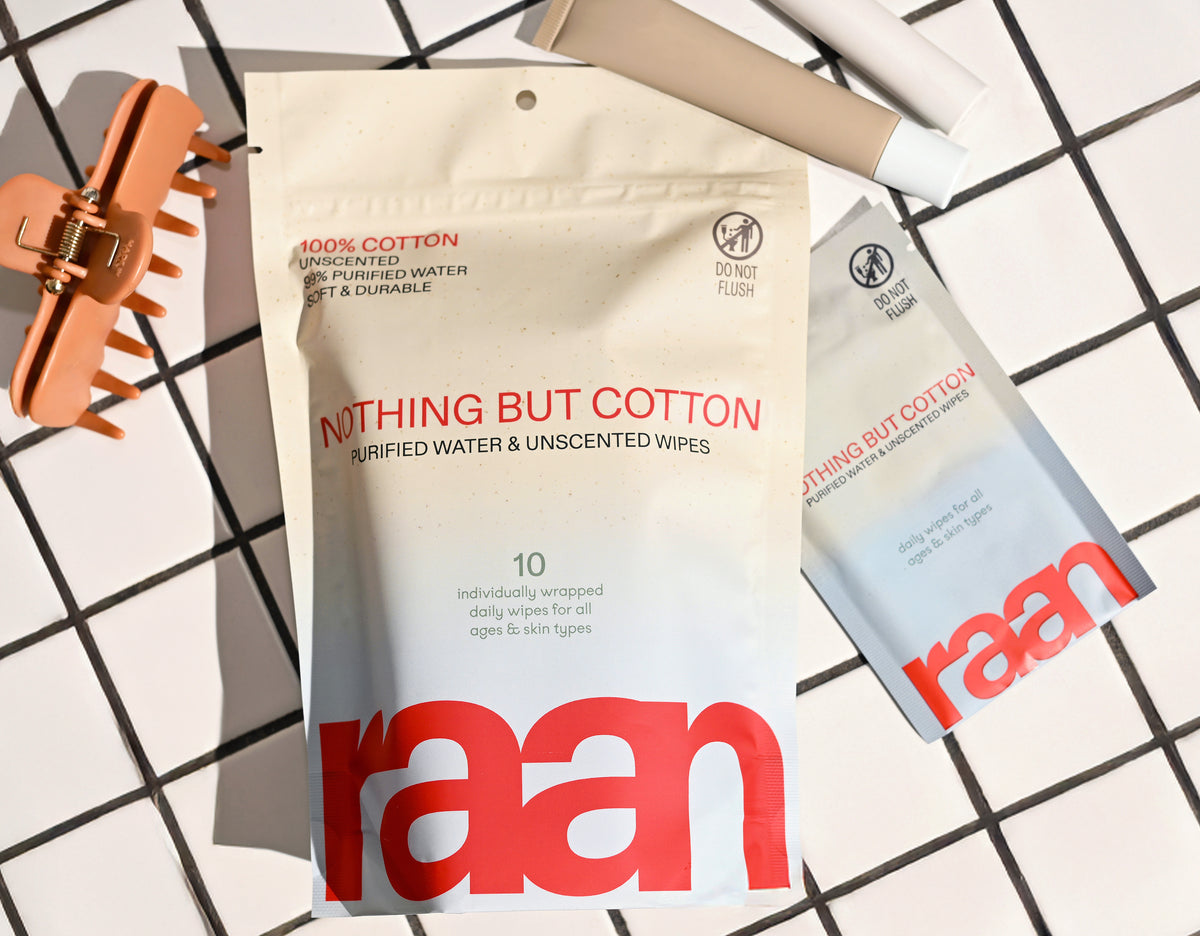Key Takeaways
- Wipes are commonly used in various daily situations such as cleaning hands, refreshing after workouts, diaper changes, and spills.
- Despite their convenience, most wipes are not as environmentally clean as they are marketed to be.
- There is a need to rethink the use and impact of everyday wipes on the environment.
Table of Contents
Introduction: Rethinking Everyday Wipes
Wipes are everywhere in our daily routines, from cleaning sticky toddler hands to quick post-workout refreshes, diaper changes, and those inevitable spills that happen when life gets messy. But here's the thing: most wipes aren't as clean as they claim to be.
Conventional wipes often hide significant environmental costs behind colorful packaging and feel-good marketing. Many contain plastic-based materials that take decades to decompose, synthetic additives that can irritate sensitive skin, and labels so vague they tell you almost nothing about what you're actually using on your body or bringing into your home.
This guide unpacks what "environmentally friendly wipe options" really means, who needs them most, and how to confidently choose better for your skin and the planet. We believe clean should be uncomplicated, honest, and truly safe for everyone, from newborns to adults with sensitive skin.
The bottom line: You shouldn't have to choose between convenience and safety, or between effectiveness and environmental responsibility. The right wipes deliver on all fronts.
What Are Environmentally Friendly Wipes?

Defining "Environmentally Friendly"
When we talk about environmentally friendly wipes, we're referring to products made from biodegradable or compostable materials, sourced from renewable resources, and formulated without harmful synthetic additives. These wipes break down naturally after disposal instead of sitting in landfills for years.
True environmental friendliness goes beyond the wipe material itself. It includes transparent ingredient lists, minimal processing, and packaging that reduces plastic waste. Look for third-party certifications like EWG Verified, which means every ingredient has been thoroughly vetted for safety.
Key markers to look for: Unbleached, 100% cotton material, minimal ingredient lists with food-grade preservatives, and clear certifications from trusted organizations.
How Eco-Friendly Wipes Differ from Conventional
The differences between eco-friendly and conventional wipes are significant, starting with the base material. Eco-friendly options typically use cotton, bamboo, or other plant-based fibers that naturally decompose. Conventional wipes often rely on polyester or plastic fiber blends that persist in the environment.
Formulation matters just as much as material. Environmentally friendly wipes feature minimal, transparent ingredient lists, think purified water, gentle preservatives like sodium benzoate, and skin-conditioning ingredients like organic aloe. Conventional wipes frequently contain synthetic fragrances, harsh chemical preservatives, and unnecessary additives that can irritate skin and burden waterways.
At Raan, our wipes contain no plastic fibers, synthetic fragrances, bleach, or harsh chemicals, just five EWG-verified ingredients that work effectively while staying gentle on skin and the environment.
For those seeking a convenient, travel-ready solution, individually wrapped wipes are an excellent choice for on-the-go freshness without compromising on sustainability.
Compostable vs. Biodegradable: The Real Differences
These terms get thrown around interchangeably, but they mean different things for how you dispose of your wipes. Biodegradable means the material will naturally break down over time through biological processes. Compostable is more specific, it means the material will decompose into nutrient-rich compost under specific conditions within a certain timeframe.
Here's what matters for your daily routine: biodegradable wipes might take months or years to fully decompose, depending on environmental conditions. Compostable wipes are designed to break down completely in 90-180 days in proper composting environments. However, not all compostable wipes work in home compost bins, some require industrial composting facilities with higher temperatures.
Reality check: Even the most eco-friendly wipes should go in your regular trash if you don't have access to appropriate composting. The important thing is choosing wipes made from materials that won't persist in landfills for decades.
Environmental Impact: Why It Matters
The Problem with Most Wipes
Conventional wipes create environmental problems that extend far beyond your trash can. Most are made from plastic-based materials like polyester that can take 100+ years to decompose in landfills. During that time, they release microplastics into soil and waterways, contributing to pollution that affects wildlife and water quality.
The "flushable" wipe problem deserves special attention. Despite labels claiming otherwise, these wipes don't break down in sewer systems like toilet paper does. They cause expensive blockages in municipal water treatment facilities and contribute to fatbergs, massive clogs that cost cities millions to remove. Learn more about the rising costs and environmental impact of disposable wet wipes.
Single-use consumption habits amplify these issues. The average household uses hundreds of wipes monthly, and when each one contains synthetic materials and harsh chemicals, that impact adds up quickly.
The Eco-Friendly Advantage
Environmentally friendly wipes address these problems at the source. Materials like unbleached cotton and bamboo fibers break down naturally in 6 months to 2 years, depending on conditions. Instead of releasing microplastics, they decompose into harmless organic matter.
The chemical load matters too. Eco-friendly formulations with minimal, food-grade ingredients put less stress on water treatment systems and reduce the potential for skin irritation. When you choose wipes with transparent ingredient lists, you know exactly what's going down the drain.
Packaging improvements make a difference as well. Raan's soft pack design uses 70% less plastic than traditional hard-lid containers, and our pouches contain 35% post-consumer recycled content. Our boxes are 100% recyclable, creating a complete package that aligns with environmental values.
| Aspect | Conventional Wipes | Eco-Friendly Options |
|---|---|---|
| Base Material | Polyester/plastic blends | Cotton, bamboo, plant fibers |
| Decomposition Time | 100+ years in landfills | 6 months to 2 years |
| Preservatives | Synthetic chemicals | Food-grade options |
| Fragrance | Artificial scents, allergens | Fragrance-free or natural |
| Packaging | Hard plastic containers | Reduced plastic, recyclable |
| Transparency | Vague ingredient lists | Full disclosure, certifications |
Types of Environmentally Friendly Wipes

Sensitive Skin & Baby Care Wipes
When it comes to the most delicate skin, environmentally friendly wipes need to be both gentle and effective. These wipes are designed for diaper changes, cleaning newborn hands and faces, and managing everyday messes for anyone with sensitive skin conditions.
The key features to look for include hypoallergenic formulations, fragrance-free ingredients, and materials that won't leave residue or cause irritation. Unbleached cotton stands out as the gold standard, it's naturally soft, absorbent, and free from the chemical processing that can trigger reactions.
Raan wipes excel here: Our 99% water formula with just five EWG-verified ingredients makes them safe for newborns while being versatile enough for all skin types and ages. We're not a diaper brand, we're a clean care solution for everyone.
For more on the benefits of unbleached cotton in wipes and other products, explore our in-depth guide.
Face & Body Refresh Wipes
For quick refreshes, post-workout cleanups, or maintaining your skincare routine on the go, eco-friendly face and body wipes need to balance effectiveness with gentleness. These work well for supporting dewy-skin routines, though they're not a substitute for full cleansing.
Look for wipes with moisturizing ingredients like organic aloe and pH-balancing components that won't disrupt your skin's natural barrier. The material should be strong enough to remove sweat and surface impurities without falling apart or requiring excessive rubbing.
If you have sensitive skin, you may also want to read about the best face products for sensitive skin to complement your eco-friendly wipes routine.
On-the-Go Travel Wipes
Portability meets sustainability in travel-friendly eco wipes. These need to maintain their moisture and effectiveness in compact packaging while minimizing environmental impact. The best options come in resealable pouches that prevent drying out and reduce plastic waste.
Raan's soft pack design exemplifies this approach, using 70% less plastic than traditional hard-lid containers while keeping wipes fresh and ready for sticky fingers, quick cleanups, or unexpected messes wherever life takes you.
For those who want a convenient, all-purpose solution, Nothing But Cotton Wipes, Unscented are ideal for home and travel alike.
How to Choose and Use Eco-Friendly Wipes
How to Know If a Wipe is Truly Eco-Friendly
Real eco-friendly wipes come with transparent ingredient lists and third-party certifications you can verify. Look for EWG Verified status, which means every ingredient has been screened for safety. Check for biodegradable or compostable material certifications from recognized standards organizations.
Red flags include vague "eco" claims without specifics, green packaging that distracts from actual content, and long "free from" lists that don't tell you what's actually inside. If a brand won't share their complete ingredient list or material sourcing, keep looking.
How to Switch Successfully
Transitioning from conventional to eco-friendly wipes is straightforward when you focus on quality over quantity. Start by replacing your most-used wipes, whether that's for baby care, face cleaning, or household tasks. You'll likely find that higher-quality eco wipes require fewer per use, making them more economical than expected.
Reframe your expectations around having fewer products that work better. Instead of separate wipes for every task, choose versatile options like Raan wipes that safely handle everything from sensitive baby skin to adult skincare needs.
Tips for Responsible Use and Disposal
Even eco-friendly wipes should be used mindfully. Take only what you need, quality wipes clean more effectively, so you often need fewer. Never flush any wipes, even those labeled "flushable," as they can cause expensive sewer blockages.
For disposal, compostable wipes can go in your home compost bin if they're certified for home composting. If you only have access to municipal composting or regular trash, that's still better than choosing conventional plastic-based alternatives that persist for decades. For more on the science behind eco-friendly and plant-based wipes, see this external resource on plant-based antimicrobial wipes.
The Raan Difference

We designed Raan wipes for real life, the sticky hands, quick refreshes, and everyday messes that don't wait for perfect conditions. Our unbleached, 100% cotton material paired with just five EWG-verified ingredients creates a solution that's genuinely safe for everyone from newborns to skincare enthusiasts.
What sets us apart isn't aspiration, it's honesty. We tell you exactly what's in our wipes: purified water, food-grade preservatives, skin-conditioning ethylhexylglycerin, organic aloe, and citric acid for pH balance. No plastic fibers, no synthetic fragrances, no bleach, no mystery ingredients.
Our packaging reflects the same principles. The soft pack design uses 70% less plastic than traditional containers, incorporates 35% post-consumer recycled content, and comes in 100% recyclable boxes. We're EWG Verified, Cruelty Free, Women Owned, and Made in USA, certifications that mean something because they're backed by transparent practices.
This approach has earned recognition through the 2025 National Parenting Product Awards and Baby Innovation Award, but more importantly, it delivers what busy parents, skincare lovers, and environmentally conscious consumers actually need: products that work without compromise.
Making Clean Living Simple
Choosing environmentally friendly wipe options doesn't require perfection, it requires intention. Look for unbleached cotton or bamboo materials, transparent ingredient lists, and third-party certifications you can verify. Avoid the greenwashing buzzwords and focus on brands that share complete information about what they put in their products and how they make them.
The best eco-friendly wipes work for your real, everyday life while aligning with your values. They're gentle enough for sensitive skin, effective enough for actual messes, and honest enough that you know exactly what you're bringing into your home.
Clean living isn't about finding the most aspirational products, it's about choosing functional solutions that happen to be better for you and the environment. When companies like Raan prioritize transparency, safety, and genuine sustainability over marketing hype, making better choices becomes surprisingly straightforward.





